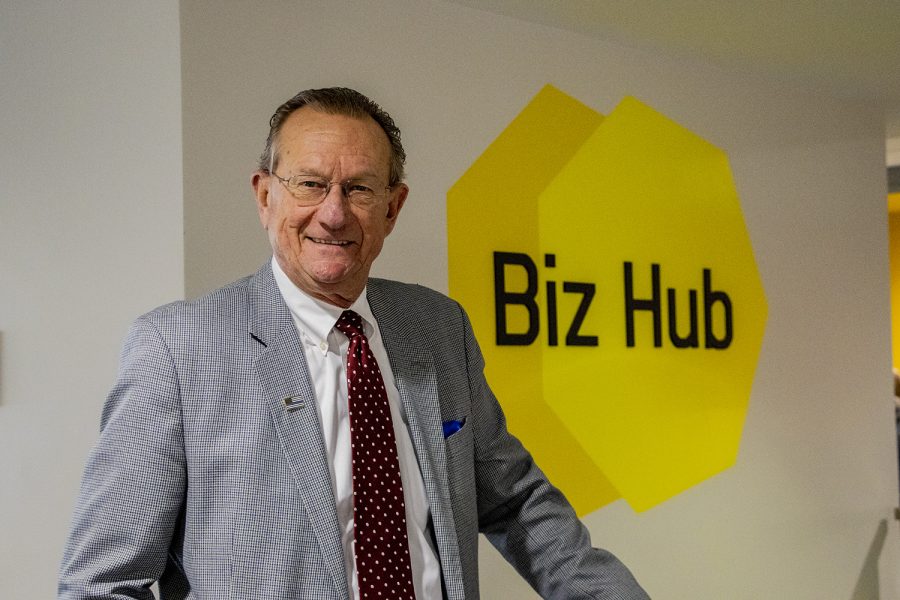UI grad student, faculty incubator facilitates entrepreneurship
Faculty in the John Pappajohn Entrepreneurial Center introduced a graduate and faculty incubator in 2021 to facilitate growth and recognition of the UI’s research.
Kurt Heiar, an associate professor of practice with the John Pappajohn Entrepreneurial Center who is helping graduate and undergraduate students succeed by providing funding for their projects, poses for a portrait in the John Pappjohn Business Building on Monday, April 4, 2022.
April 6, 2022
The University of Iowa John Pappajohn Entrepreneurial Center has developed an entrepreneurial incubator focused on allowing graduate students and faculty to gain the knowledge to push their ideas into the business marketplace.
The new incubator looks to accommodate the busy schedules of research-focused graduate students and faculty at the UI, offering them the opportunity to learn how to push their ideas out of the research labs.
Gregg Barcus, an instructor in the John Pappajohn Entrepreneurial Center’s Venture School and mentor for individuals in the incubator, said the incubator helps researchers move their intellectual property into the world.
“They have developed things in their lab or within their areas of research expertise and they’re looking to commercialize it,” Barcus said. “I think it’s part of the university’s goal and mission to help them do that.”
Kurt Heiar, director of venture acceleration for John Pappajohn Entrepreneurial Center, said the program has seen participants from across campus including individuals from within the UI Health Care system and the College of Engineering.
He said the spring cohort, consisting of 19 students and faculty, is the largest either incubator has ever had and indicates that the program is growing.
“We’re definitely seeing interest from across the campus, and that’s exactly what we’re trying to do,” Heiar said. “We’re trying to have people learn from each other, interact with each other from different backgrounds and disciplines so that as a unit we can build the ecosystem out further at the university.”
Barcus said the incubator is open to ideas from every corner of the research world and the incubator helps to facilitate entrepreneurial abilities within individuals by providing them with a “concierge-like” mentoring service.
“It’s whatever the person needs — the scientist, the doctor — to move their project closer to commercialization,” Barcus said. “The language of entrepreneurship is different than the language of the research lab.”
The incubator’s method, Barcus said, is taught nationally and begins with a hypothesis about the business, which is then tested within the community that a business is targeted toward. He said prospective business ideas may need to be tweaked based on the provided data.
The program has already produced success stories in a short period of time, with the founders of OpenLoop, a business idea focused on providing medical staffing around the country, originating from the incubator.
“They knew they didn’t know much about commercialization and how to bring something to the marketplace,” Barcus said. “The next thing you know, they had angel investors who gave them some seed money and now they’re taking off. That’s been in the space of two years, and that’s one of our success stories.”
Melissa Bates, UI associate professor of human physiology specializing in respiratory and pediatric physiology, has been one of the benefactors of the incubator as well. She said she participated in the first incubator program last year with an idea to advance how patients monitor lung disease.
“For the entire length of my career, [looking at] our ability to monitor lung disease, we haven’t really created any new tools,” Bates said. “What I learned in the first round of the incubator program, doing some customer interviews, people still rely on not being able to breathe to know whether they’re getting worse.”
Bates said it was “terrible” that individuals needed to rely on their ability to breathe to determine the health of their lungs and the progress of their lung disease. She said she believed some of the research she has done could potentially help individuals and decided to enter the entrepreneurial marketplace.
“I never thought about starting a business,” Bates said. “I decided to participate [in the incubator] and see if we could, maybe, miniaturize this research technology to be used by patients.”
Despite being in academia for 20 years now, she said she was enjoying thinking about things in ways she never had before.
“Even though I’m a tenured professor, I feel like a student all over again,” Bates said. “It’s really exciting because I’m learning so much. I had the opportunity to create this start-up, LSF medical productions and… it’s a lot of fun.”
Heiar said the incubator aims to provide participants with the resources they need to be successful. He said it is also important to grow the reach of projects and research done at the UI to a national level.
“We have exposure to a large network of support specialists,” Heiar said. “This includes people who do strategic marketing, public relations, investment counseling. [These are] all the kinds of things that people who want to commercialize and build a company need to have a network in order to do.”



